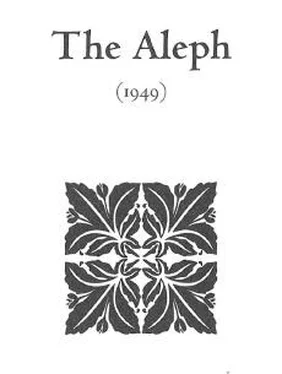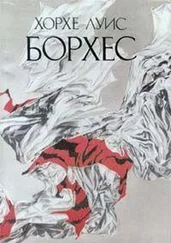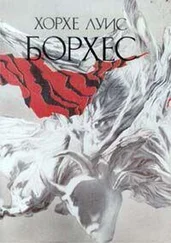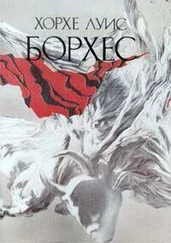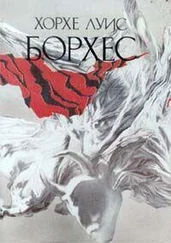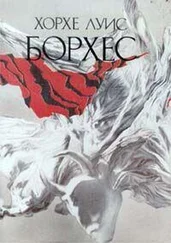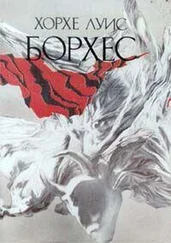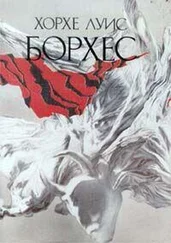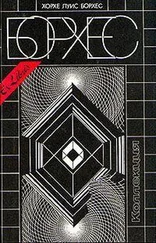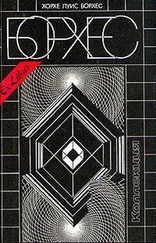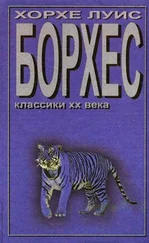Хорхе Борхес - Collected Fictions
Здесь есть возможность читать онлайн «Хорхе Борхес - Collected Fictions» весь текст электронной книги совершенно бесплатно (целиком полную версию без сокращений). В некоторых случаях можно слушать аудио, скачать через торрент в формате fb2 и присутствует краткое содержание. Год выпуска: 1999, ISBN: 1999, Издательство: Penguin (UK), Жанр: Старинная литература, на английском языке. Описание произведения, (предисловие) а так же отзывы посетителей доступны на портале библиотеки ЛибКат.
- Название:Collected Fictions
- Автор:
- Издательство:Penguin (UK)
- Жанр:
- Год:1999
- ISBN:9780140286809
- Рейтинг книги:5 / 5. Голосов: 1
-
Избранное:Добавить в избранное
- Отзывы:
-
Ваша оценка:
- 100
- 1
- 2
- 3
- 4
- 5
Collected Fictions: краткое содержание, описание и аннотация
Предлагаем к чтению аннотацию, описание, краткое содержание или предисловие (зависит от того, что написал сам автор книги «Collected Fictions»). Если вы не нашли необходимую информацию о книге — напишите в комментариях, мы постараемся отыскать её.
Collected Fictions — читать онлайн бесплатно полную книгу (весь текст) целиком
Ниже представлен текст книги, разбитый по страницам. Система сохранения места последней прочитанной страницы, позволяет с удобством читать онлайн бесплатно книгу «Collected Fictions», без необходимости каждый раз заново искать на чём Вы остановились. Поставьте закладку, и сможете в любой момент перейти на страницу, на которой закончили чтение.
Интервал:
Закладка:
The road dropped and forked as it cut through the now-formless meadows. A keen and vaguely syllabic song, blurred by leaves and distance, ram*» anrl went on the gentle mists of breeze. I was struck by the thought that a man may be the enemy of other men, the enemy of other men's other moments, yet not be the enemy of a country—of fireflies, words, gardens, watercourses, zephyrs. It was amidst such thoughts that I came to a high rusty gate. Through the iron bars I made out a drive lined with poplars, and a gazebo of some kind. Suddenly, I realised two things—the first trivial, the second almost incredible: the music I had heard was coming from that gazebo, or pavillion, and the music was Chinese. That was why unconsciously I had fully given myself over to it. I do not recall whether there was a bell or whether I had to clap my hands to make my arrival known.
The sputtering of the music continued, but from the rear of the intimate house, a lantern was making its way toward me—a lantern cross-hatched and sometimes blotted out altogether by the trees, a paper lantern the shape of a drum and the colour of the moon. It was carried by a tall man. I could not see his face because the light blinded me. He opened the gate and slowly spoke to me in my own language.
"I see that the compassionate Hsi P'eng has undertaken to remedy my solitude. You will no doubt wish to see the garden?"
I recognised the name of one of our consuls, but I could only disconcertedly repeat, "The garden?"
"The garden of forking paths."
Something stirred in my memory, and I spoke with incomprehensible assurance.
"The garden of my ancestor Ts'ui Pen."
"Your ancestor? Your illustrious ancestor? Please—come in."
The dew-drenched path meandered like the paths of my childhood. We came to a library of Western and Oriental books. I recognised, bound in yellow silk, several handwritten volumes of the Lost Encyclopedia compiled by the third emperor of the Luminous Dynasty but never printed. The disk on the gramophone revolved near a bronze phoenix. I also recall a vase of famillerose and another, earlier by several hundred years, of that blue colour our artificers copied from the potters of ancient Persia....
Stephen Albert, with a smile, regarded me. He was, as I have said, quite tall, with sharp features, grey eyes, and a grey beard. There was something priestlike about him, somehow, but something sailorlike as well; later he told me he had been a missionary in Tientsin "before aspiring to be a Sinologist."
We sat down, I on a long low divan, he with his back to the window and a tall circular clock. I figured that my pursuer, Richard Madden, could not possibly arrive for at least an hour. My irrevocable decision could wait.
"An amazing life, Ts'ui Pen's," Stephen Albert said. "Governor of the province in which he had been born, a man learned in astronomy, astrology, and the unwearying interpretation of canonical books, a chess player, a renowned poet and calligraphier—he abandoned it all in order to compose a book and a labyrinth. He renounced the pleasures of oppression, justice, the populous marriage bed, banquets, and even erudition in order to sequester himself for thirteen years in the Pavillion of Limpid Solitude. Upon his death, his heirs found nothing but chaotic manuscripts. The family, as you perhaps are aware, were about to deliver them to the fire, but his counsellor—a Taoist or Buddhist monk—insisted upon publishing them."
"To this day," I replied, "we who are descended from Ts'ui Pen execrate that monk. It was senseless to publish those manuscripts. The book is a contradictory jumble of irresolute drafts. I once examined it myself; in the third chapter the hero dies, yet in the fourth he is alive again. As for Ts'ui Pen's other labor, his Labyrinth ..."
"Here is the Labyrinth," Albert said, gesturing towards a tall lacquered writing cabinet.
"An ivory labyrinth!" I exclaimed. "A very small sort of labyrinth ..."
"A labyrinth of symbols," he corrected me. "An invisible labyrinth of time. I, an English barbarian, have somehow been chosen to unveil the diaphanous mystery. Now, more than a hundred years after the fact, the precise details are irrecoverable, but it is not difficult to surmise what happened. Ts'ui Pen must at one point have remarked, 'I shall retire to write a book,' and at another point, 'I shall retire to construct a labyrinth.' Everyone pictured two projects; it occurred to no one that book and labyrinth were one and the same. The Pavillion of Limpid Solitude was erected in the centre of a garden that was, perhaps, most intricately laid out; that fact might well have suggested a physical labyrinth. Ts'ui Pen died; no one in all the wide lands that had been his could find the labyrinth. The novel's confusion—confusedness, I mean, of course—suggested to me that it was that labyrinth. Two circumstances lent me the final solution of the problem—one, the curious legend that Ts'ui Pen had intended to construct a labyrinth which was truly infinite, and two, a fragment of a letter I discovered."
Albert stood. His back was turned to me for several moments; he opened a drawer in the black-and-gold writing cabinet. He turned back with a paper that had once been crimson but was now pink and delicate and rectangular. It was written in Ts'ui Pen's renowned calligraphy. Eagerly yet uncomprehendingly I read the words that a man of my own lineage had written with painstaking brushstrokes: I leave to several futures (not to all) my garden of forking paths. I wordlessly handed the paper back to Albert. He continued:
"Before unearthing this letter, I had wondered how a book could be infinite. The only way I could surmise was that it be a cyclical, or circular, volume, a volume whose last page would be identical to the first, so that one might go on indefinitely. I also recalled that night at the centre of the 1001 Nights, when the queen Scheherazade (through some magical distractedness on the part of the copyist) begins to retell, verbatim, the story of the looi Nights, with the risk of returning once again to the night on which she is telling it—and so on, ad infinitum. I also pictured to myself a platonic, hereditary sort of work, passed down from father to son, in which each new individual would add a chapter or with reverent care correct his elders' pages. These imaginings amused and distracted me, but none of them seemed to correspond even remotely to Ts'ui Pen's contradictory chapters. As I was floundering about in the mire of these perplexities, I was sent from Oxford the document you have just examined. I paused, as you may well imagine, at the sentence 'I leave to several futures (not to all) my garden of forking paths.' Almost instantly, I saw it—the garden of forking paths was the chaotic novel; the phrase 'several futures (not all)' suggested to me the image of a forking in time, rather than in space. A full rereading of the book confirmed my theory. In all fictions, each time a man meets diverse alternatives, he chooses one and eliminates the others; in the work of the virtually impossible-to-disentangle Ts'ui Pen, the character chooses— simultaneously—all of them. He creates, thereby, 'several futures,' several times, which themselves proliferate and fork. That is the explanation for the novel's contradictions. Fang, let us say, has a secret; a stranger knocks at his door; Fang decides to kill him. Naturally, there are various possible outcomes—Fang can kill the intruder, the intruder can kill Fang, they can both live, they can both be killed, and so on. In Ts'ui Pen's novel, all the outcomes in fact occur; each is the starting point for further bifurcations. Once in a while, the paths of that labyrinth converge: for example, you come to this house, but in one of the possible pasts you are my enemy, in another my friend. If you can bear my incorrigible pronunciation, we shall read a few pages."
Читать дальшеИнтервал:
Закладка:
Похожие книги на «Collected Fictions»
Представляем Вашему вниманию похожие книги на «Collected Fictions» списком для выбора. Мы отобрали схожую по названию и смыслу литературу в надежде предоставить читателям больше вариантов отыскать новые, интересные, ещё непрочитанные произведения.
Обсуждение, отзывы о книге «Collected Fictions» и просто собственные мнения читателей. Оставьте ваши комментарии, напишите, что Вы думаете о произведении, его смысле или главных героях. Укажите что конкретно понравилось, а что нет, и почему Вы так считаете.
